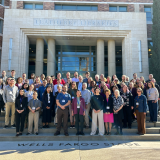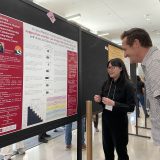npj Quantum Information Journal Publishes Article by Drs. Waegell and Dressel
Announced on August 2, 2019
Quantum computers have the potential to be exponentially faster at certain tasks than classical computers given similar hardware resources. This remarkable capability necessarily causes corresponding engineering challenges. To achieve an exponential performance gain, quantum hardware becomes exponentially more sensitive to environmental noise than classical hardware. This fact motivates a search for efficient calibration and benchmarking methods that can verify correct operation and diagnose error mechanisms. Brute-force calibration has been tractable for small numbers of quantum bits but is untenable for the larger collections of bits desired for interesting computational tasks.
To address the need for a scalable calibration method, post-doctoral fellow Dr. Mordecai Waegell and director of physics Dr. Justin Dressel introduce a family of benchmarks in their recent article in npj Quantum Information. These benchmarks verify the creation of genuine multi-bit entanglement (a key quantum resource for accelerating computational tasks) and only scale linearly with the number of bits. This exponential improvement over brute-force methods should make the new benchmarks attractive for inclusion into standard hardware calibration procedures. The benchmarks naturally generalize celebrated two-bit benchmarks known as Bell inequalities by identifying multi-bit sets of measurable observables that jointly defy globally predefined value assignments. This unusual property has no counterpart in classical computation and enables efficient witnesses to be constructed that directly expose the logical contradiction as inequality bound violations. Moreover, these bound violations only occur when the quantum system has been successfully prepared in particular entangled states, and the violations degrade as the preparation degrades in quality. These features make the benchmark bound violations practical witnesses for correct hardware operation.
Drs. Waegell and Dressel are both members of the Institute of Quantum Studies at Chapman University.
Congrats to Drs. Waegell and Dressel! Read their article – “Benchmarks on nonclassicality for qubit arrays” >>

